Is professional certification or license in Christian Counseling for you? Throughout each year we receive many calls from individuals who are seeking a sense of direction regarding training, education, and credentialing in Christian Counseling.
Each individual must decide if he or she is being lead of God to be a servant of the Church (body of Christ) or an agent of the state (Secular/State License). If you have a divine call on your life to counsel and minister to the hurting, then a state license may inhibit such a ministry.
The Apostle Paul, in his letter found in Romans 15:14-16 (NIV) stated, “I myself am convinced, my brothers and sisters, that you yourselves are full of goodness, filled with knowledge, and competent to instruct one another. Yet I have written you quite boldly on some points to remind you of them again, because of the grace God gave me to be a minister of Christ Jesus to the Gentiles. He gave me the priestly duty of proclaiming the gospel of God, so that the Gentiles might become an offering acceptable to God, sanctified by the Holy Spirit”.
The word ‘competent’, as used in this passage, connotes that well equipped and trained believers are able to counsel (admonish, reprove, exhort, instruct) one another. Paul also referred to this kind of ministry as hard work or laborious (cf. 1 Thessalonians 5:12). It is a work of service and labor of love for which counselors, within the Body of Christ, need to be adequately equipped and deemed competent to serve.
The scriptures clearly teach us that 5-Fold Ministry Leaders have a responsibility to equip the saints for the work of ministry (cf. Ephesians 4:11-16). This includes the task of training fellow believers to counsel biblically. According to the word of God; a properly equipped Christian, with a love for and a working knowledge of the Scriptures, is far more competent to counsel than a psychologist or psychotherapist trained in the secular realm. This is not to say that God cannot use those individuals as well. But clearly, Christian counseling is a work of service where the equipping should take place within the body of Christ.
Most states have regulatory laws governing the practice of psychology. Many states also legislate the practice of general counseling. State regulatory laws help to protect the public and ensure professionalism within the counseling profession. Training and education Christian counseling should strive to attain a similar goal with the Christian community while also endeavoring to avoid infringing upon state regulations. The state and federal governments also have jurisdictional boundaries. They cannot pass laws that prevent the Church from fulfilling its purpose and ministering to the needs of humanity. The state recognizes that counseling is one of the responsibilities of the Church and its clergy. For this reason, the state does not and must not interfere with the Ministry of Counseling
The major difference between state-licensed professional counselors and Pastoral or Christian counselors, who are certified and licensed under the authority of the Church (Body of Christ), is clear and well-defined. Counselors who have been licensed by the state are held to strict ethical standards which mandate an individual’s right to be free from religious influence. The state licensed professional counselor must adhere to very strict guidelines around prayer, reading or refer to the Holy Scripture, or counsel things that are contrary to the scriptures (ie. homosexuality, abortion, etc). Initiating such counsel would be considered unethical by the state. The only time a state licensed counselor can involve religious (Christian) principles, morals, activities, instruction, etc., is if the counselee initiates or requests counsel in these areas. In addition, the state-licensed counselor may not have the training, education, experience, and knowledge of Scripture that graduates of Christian counseling training programs have.
Opposite from state-licensed counselors, Biblical/Pastoral/Christian counselors are required to pray, share their faith, read from the Holy Scriptures, etc. The fact that Biblical /Pastoral/Christian counselors do these things creates a clear distinction.
While we provide professional services, we are first vocational ministers of the gospel (cf. Romans 15:14-16). Professionally speaking, the two disciplines (secular and ministerial) are distinct and should be governed accordingly. The state governs secular counselors and the Church is responsible to set standards and govern ministers who have devoted their lives to the ministry and to Biblical /Pastoral/Christian counseling.
This is not to say that Christian counselors, chaplains, ministers or priest are not permitted to request fees and receive remuneration, for the services rendered, as long as they remain adherent to the state laws governing remuneration. After all, 1 Timothy 5:18 does teach us that ‘the laborer is worthy of his wages”.
Is God leading you to become better equipped, through certification and/or licensing, for Christian counseling ministry? If you answered ‘yes’, pursuing nationally recognized training and credentials can greatly benefit you and those you serve.
